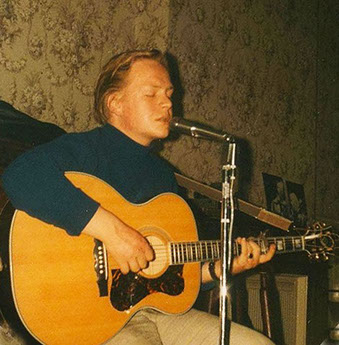





JACKSON C. FRANK - BMHOF CLASS OF 2015

Talent and tragedy. Those are the two threads woven together through Jackson C. Frank’s story.
Frank, a Cheektowaga native, was one of the brightest lights of the British folk revival of the 1960s.
His lone LP was produced by Paul Simon in Britain before Simon’s career with Garfunkel took off. The duo even recorded their version of what would become Frank’s classic song, “Blues Run the Game,” although it wouldn’t become available until it was released on a 1997 boxed set.
Those who remember Frank, though, remember an artist whose life was marred by physical pain, and mental illness as well.
The stories about Jackson C. Frank always seem to start on March 31, 1954, when a fire broke out in Cleveland Hill School. Fifteen sixth graders died. Jackson C. Frank was one of the 24 students who survived, but was left forever marked by it. He suffered burns that put him in the hospital for eight months and left his hands and face scarred.
But the reason the world remembers Frank is what came later. After finishing high school at Iroquois Central, he worked as a copy boy at the Buffalo News and spent a year at college. He was a regular on the folk music scene that flourished at coffee houses like the Limelight and the Boar in the Allentown area, hanging out with performers such as John Kay (later of Steppenwolf) and John Boylen (who would go on to assemble a group of performers to back up Linda Ronstadt that would later become the Eagles).
He also was the recipient of a $80,000 trust fund at age 21 as a result of a settlement after the fire, and he used some of that money to follow a girlfriend to England. That was where he made his mark.
Frank had a distinctive fingerpicking style, perhaps inspired by the sensitivity and scarring of his hands. He also had a way with a song.
He was a regular presence in the London folk scene, befriending a young Al Stewart (whose style has similarities to Frank’s), as well as now-legendary musicians such as Bert Jansch and John Renbourn. His girlfriend – briefly – was soon to become legendary Sandy Denny, who was later to write a song seemingly about Frank.
But it took Paul Simon to get him into the studio. Simon put down 50 pounds – around $75 – of his own money to record two three-hour sessions on Frank at Levy’s Sound Studio on New Bond Street in London. Others at the session included Denny, Art Garfunkel, Stewart and Judith Piepe, a London patron of folk artists.
Frank, who always struggled with facing an audience, had a hard time performing in the studio with others watching, so Simon finally screened him and he was able to play.
The resulting album came out on EMI Columbia Records in Britain. It was reported to have sold about 5,000 copies, but “Blues Run the Game,” a song that seemed to reflect elements of Frank’s travels, went on to be covered by Jansch, Denny, Renbourn, Nick Drake, Carolyn Hester, Counting Crows, Ralph McTell and a host of others. The rest of the album was well regarded as well.
Art Garfunkel recalled the recording on WNEW-FM in 1997 during an interview on Vin Scelsa’s “Idiot’s Delight” program.
“He's a part of my memories of the days we were in England. He lived with us in Judith's house in the East End, the poor part of town, because we all had no money,” Garfunkel said. “
… (Judith Piepe) was this woman in England, a sort of religious, quasi-social worker. A German émigré from Berlin who transplanted to England, (she) did a lot of work with the church and with radio, and was a wonderful kind of Gertrude Stein-Bohemian-daring soul, with a very good ear to who had talent.
“And she picked up on Paul, and then we together began to stay at Judith's house, uh, she would put us up in the back room … she would collect all kinds of disenfranchised people – from hookers and drug addicts –and she would let them stay at her house for awhile, and we were sort of the mainstays sharing the back room. … And Jackson was part of our lives then. She helped him, and he was a wonderful writer …
“He was an American who was living there. … He was collecting money from insurance, driving an Aston Martin, writing these great songs. And he fit into these years, 1963-64. We took a trip with Jackson on the Continent – me and Jackson and Paul and Kathy – and we did our street singing in Paris, Geneva, Nice. We'd pull into town, and we'd sing in restaurants or on the sidewalk with our heads looking over to see if the cops were going to stop us, and collect money and move on. So I have great memories, because those are those, you know, when you're in your early twenties it's a very impressionable, romantic part of life.”
That LP — simply titled “Jackson C. Frank” — was Frank’s only major label release, and only real recording of note during his lifetime. He continued to play around London for another year, but by then had run through his money.
He brought Briton Elaine Sedgwick back to Western New York, and they were married in 1967 in Elma. They lived in Woodstock, where Frank was involved in the Woodstock “Sound-Outs” that preceded the famous festival in Bethel in 1969.
But mental illness was starting to assert itself in Frank’s life, and when he and Elaine lost a second baby – this time at childbirth – he went into a spiral. While he was able to bounce back on occasion, he kept losing ground. He and Elaine did have a daughter before they were divorced. Frank spent most of the 1980s and ‘90s bouncing between homelessness, mental institutions and short periods of recovery.
Jackson C. Frank died of a combination of pneumonia and heart attack on March 3, 1999.
Since then, there has been a Frank revival of sorts. His “Jackson C. Frank” album was reissued in 2002 with five bonus tracks recorded in Woodstock in the 1970s. Vincent Gallo used one of his songs in a film soundtrack. In 2015, the “Complete Jackson C. Frank” was released on Ba Da Bing Records, with 67 tracks – most of them previously unreleased.
Meanwhile writer Jim Abbott’s “Jackson C. Frank: The Clear, Hard Light of Genius,” a biography, was released by Ba Da Bing Records in 2014. Much of the detail in this short biography is drawn from that book.
Written by Elmer Ploetz
On February 24, 2017, Buffalo TV Station, WKBW, ran a story on Jackson C. Frank.
Click here for the link to that story.